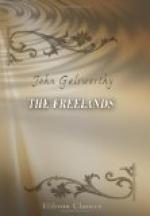In the last fields before the Joyfields crossroads they came up with a little, square, tow-headed man, without coat or cap, who had just driven some cattle in and was returning with his dog, at a ‘dot-here dot-there’ walk, as though still driving them. He gave them a look rather like that of the bullock Nedda had tried to stroke. She knew he must be one of the Malloring men, and longed to ask him questions; but he, too, looked shy and distrustful, as if he suspected that they wanted something out of him. She summoned up courage, however, to say: “Did you see about poor Bob Tryst?”
“I ’eard tell. ‘E didn’ like prison. They say prison takes the ’eart out of you. ‘E didn’ think o’ that.” And the smile that twisted the little man’s lips seemed to Nedda strange and cruel, as if he actually found pleasure in the fate of his fellow. All she could find to answer was:
“Is that a good dog?”
The little man looked down at the dog trotting alongside with drooped tail, and shook his head:
‘E’s no good wi’ beasts—won’t touch ’em!” Then, looking up sidelong, he added surprisingly:
“Mast’ Freeland ’e got a crack on the head, though!” Again there was that satisfied resentment in his voice and the little smile twisting his lips. Nedda felt more lost than ever.
They parted at the crossroads and saw him looking back at them as they went up the steps to the wicket gate. Amongst a patch of early sunflowers, Tod, in shirt and trousers, was surrounded by his dog and the three small Trysts, all apparently engaged in studying the biggest of the sunflowers, where a peacock-butterfly and a bee were feeding, one on a gold petal, the other on the black heart. Nedda went quickly up to them and asked:
“Has Derek come, Uncle Tod?”
Tod raised his eyes. He did not seem in the least surprised to see her, as if his sky were in the habit of dropping his relatives at ten in the morning.
“Gone out again,” he said.
Nedda made a sign toward the children.
“Have you heard, Uncle Tod?”
Tod nodded and his blue eyes, staring above the children’s heads, darkened.
“Is Granny still here?”
Again Tod nodded.
Leaving Felix in the garden, Nedda stole upstairs
and tapped on
Frances Freeland’s door.
She, whose stoicism permitted her the one luxury of never coming down to breakfast, had just made it for herself over a little spirit-lamp. She greeted Nedda with lifted eyebrows.
“Oh, my darling! Where have you come from? You must have my nice cocoa! Isn’t this the most perfect lamp you ever saw? Did you ever see such a flame? Watch!”
She touched the spirit-lamp and what there was of flame died out.
“Now, isn’t that provoking? It’s really a splendid thing, quite a new kind. I mean to get you one. Now, drink your cocoa; it’s beautifully hot.”




